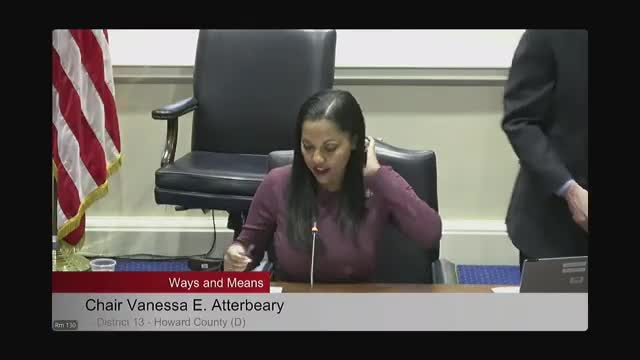Maryland officials pitch HB 59 to limit tax-sale foreclosures and shield homeowners from unpaid utility bills
Get AI-powered insights, summaries, and transcripts
Subscribe
Summary
House Bill 59 would change how Maryland jurisdictions handle tax-sale foreclosures to give struggling homeowners more time and more options to keep their homes, administration and legal services officials told the House Ways and Means Committee on Jan. 28.
House Bill 59 would change how Maryland jurisdictions handle tax-sale foreclosures to give struggling homeowners more time and more options to keep their homes, administration and legal services officials told the House Ways and Means Committee on Jan. 28.
The bill would raise the minimum debt threshold for inclusion in a tax sale to $1,000, extend the period before foreclosure proceedings can begin, cap post-sale interest at 10 percent (down from as much as 20 percent in some counties), exclude properties from tax sale when the only liens are unpaid water and sewer bills, and require enhanced notice and outreach — including 90 days’ tenant notice and copies of foreclosure notices sent to the state tax-sale ombudsman.
If enacted, HB 59 would also broaden who qualifies as a “homeowner” for relief programs to include estates, personal representatives and heirs who inherit property, authorize local payment plans for redemption, and require counties to retain tax-sale records for at least three years.
Secretary Jake Day of the Maryland Department of Housing and Community Development said the measure aims to ‘‘help keep people in their homes’’ and that the department supports the bill as a complement to housing production efforts. Bob Yeager, deputy director of the State Department of Assessments and Taxation (SDAT), walked the committee through the bill’s key provisions and said implementation would not have a fiscal impact on the state.
Legal services providers, housing advocates, local elected officials and nonprofit groups urged the committee to preserve the bill’s broader protections. Speakers described clients who faced tax sale after relatively small unpaid balances — sometimes driven by medical bills, the death of a spouse, or utility disputes — and said that tailored, documented processes and outreach have prevented repeat cycles of tax distress. Several witnesses asked the committee not to narrow the proposed exclusion for unpaid water and sewer charges to owner-occupied properties, citing database inaccuracies that can misclassify homes and examples where churches and heirs benefited from the broader Baltimore City protections.
County and municipal groups — including the Maryland Association of Counties and Maryland Municipal League — expressed concerns about the proposal to remove water and sewer only liens from the tax-sale process, calling those enterprise funds and warning that eliminating tax-sale collection for utilities could shift costs onto water systems and other ratepayers. Maryland Tax Sale Participants Association representatives and tax-sale purchasers opposed broader changes that would further lengthen timelines or reduce collection incentives, saying tax sale is a critical enforcement tool.
Committee members pressed witnesses on trade-offs: whether extending redemption timelines adds up to larger accrued taxes for homeowners, how Baltimore City’s prior reforms affected collections, and what alternative collection tools (payment plans, license revocations, targeted outreach to commercial accounts) counties can use if utility liens are excluded from tax sale. SDAT and DHCD officials said the bill preserves local authority to foreclose on vacant and abandoned properties and to offer vacant-property remedies, and that the state’s tax-sale ombudsman and homeowner protection programs already perform outreach to thousands of homeowners annually.
Supporters asked the committee for a favorable report; opponents asked for more time to negotiate amendments that would limit the utility exclusion to owner-occupied properties or otherwise protect utility enterprise funds.
Ending note: The committee did not record a final vote during the hearing. Sponsors, state agencies and a wide coalition of legal-services, housing and community groups said they were willing to continue working on language to address county and municipal fiscal concerns while protecting vulnerable homeowners and heirs.
